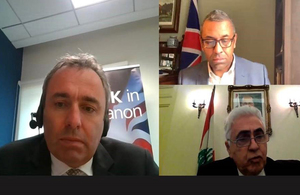‘Tech for Growth’ designed to increase financial services access
The UK Department for International Trade (DIT) has today launched its ‘Tech for Growth’ Programme to enhance the role technology can play in expanding access to financial services, and support future trading opportunities between the UK and emerging economies.
The first year of the programme will be piloted across Africa, where access to financial services remains low. There are further plans for the programme to expand globally across South East Asia and Latin America.
In its first year, ‘Tech for Growth’ will deliver three pillars of activity:
- Establish a UK-Africa ‘Tech for Growth’ community: Designed to expand access to financial services for underserved communities. It will include events across the UK and Africa to promote partnerships between British and African technology and financial services companies.
- Empower UK-Africa FinTech trade: Highlight commercial opportunities, leverage research, and address barriers that currently inhibit successful scaling of the FinTech sector.
- Support the growth of future tech markets: Collaborate with African governments and regulators to grow their tech sector, and develop future trading partnerships with the UK.
Gerry Grimstone, UK Minister for Investment said:
Diversifying and increasing trade and investment in sectors such as tech will be crucial for economic recovery from Coronavirus, and Britain has a vital role to play globally.
The UK is home to some of the most innovative tech companies in the world while also being one of the deepest and most globally connected financial centres. It is why we are the top choice for tech firms seeking a base to launch internationally into new markets.
This programme will further deepen our trade relationships with some of the most exciting emerging markets around the world, and lead to solutions that address one of the most prominent global challenges in today’s world, financial inclusion.
Emma Wade-Smith OBE, HM Trade Commissioner for Africa said:
Around 60% of adults in sub-Saharan African still do not have access to traditional means of financial services, including banking and insurance. With mobile phone penetration rates having risen to over 40%, technology can play an increasing role in expanding access to financial services and other sectors.
Tech for Growth will be instrumental in strengthening the partnership between Africa and the UK, driving financial inclusion through technology and innovation.
‘Tech for Growth’s’ research programme will help to overcome the underlying market barriers and frictions to trade, faced by tech companies looking to scale into emerging markets.
This first research output, ‘Inclusive Tech: Overcoming barriers to scale in emerging markets’ is launched alongside ‘Tech for Growth’. Produced in partnership with The Catalyst Fund, a FinTech accelerator supported by UK aid, the report outlines seven barriers currently inhibiting growth in the technology sector across emerging markets.
Maelis Carraro, Director Catalyst Fund said:
Technology has the potential to improve the access, quality and relevance of financial services for underserved populations around the world and dynamic tech startups are at the forefront of this innovation across emerging markets.
However, tech startups in emerging markets face several challenges to scale their solutions, from lack of capital and talent to poor infrastructure and regulatory barriers. Governments and market enablers have an important role to play in helping startups overcome these barriers and enable inclusive growth. This report identifies the key barriers innovators face and offers potential solutions.
For more information contact techforgrowth@trade.gov.uk
Download the report: Inclusive Tech: Overcoming barriers to scale in emerging markets
The Catalyst Fund
The Catalyst Fund is an accelerator for inclusive fintech startups and innovation ecosystems, in emerging markets, supported by UK aid through DFID and JPMorgan Chase & Co. The mission of the Catalyst Fund is to accelerate the development of affordable, accessible, and appropriate digital financial solutions for the world’s 3 billion underserved.

